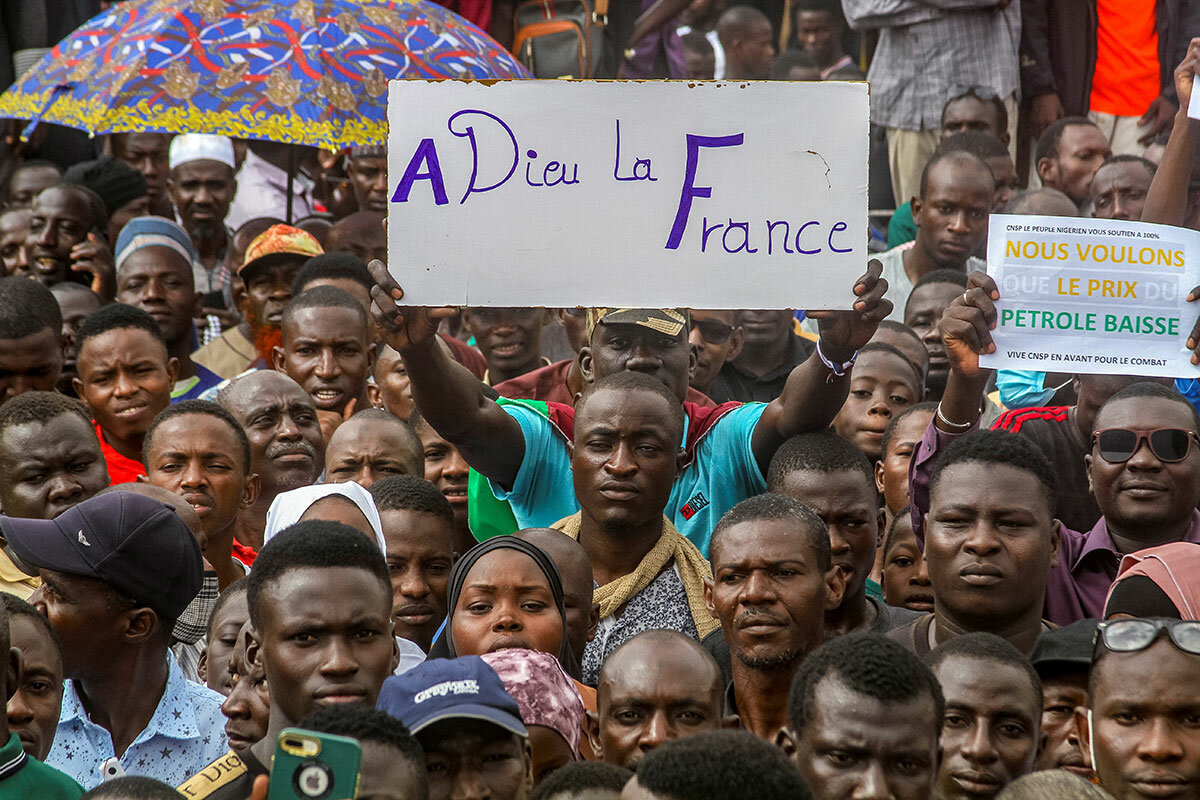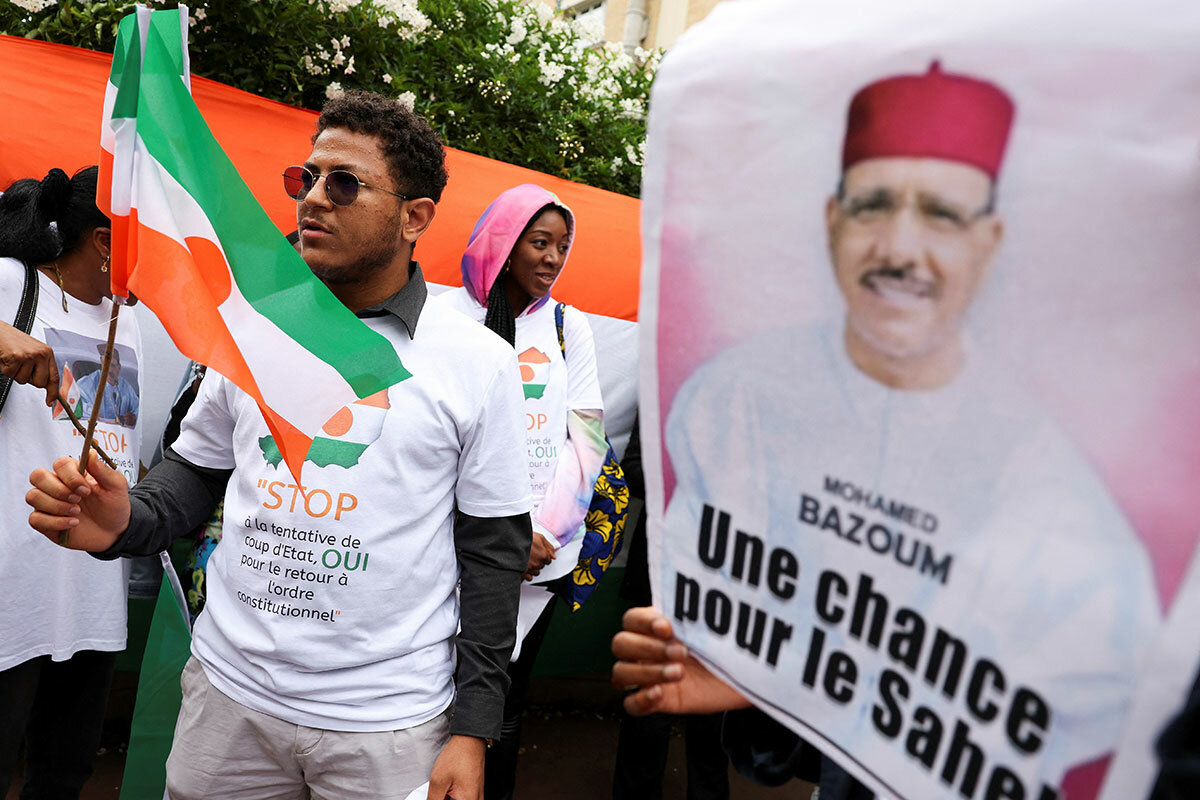In Niger, military takes control, with Moscow in the wings
Loading...
| London
It was supposed to be everything Afghanistan wasn’t: a broad, strategically planned U.S. military, economic, political, and social partnership with a stable democratic government, and few American boots on the ground, aimed at turning back a tide of jihadist insurgency.
With wider geopolitical stakes, too, as military juntas were seizing power in nearby states and buttressing their hold on power with Russian Wagner Group mercenaries.
Yet now, with one sharp shock, all of that has been thrown into doubt.
Why We Wrote This
When the last elected government in the Sahel region of Africa fell to a military coup last month, Western hopes for a broad-based campaign against Islamic jihadis lost ground to Moscow’s more martial approach, implemented by mercenaries.
Because within the space of a few hours late last month, military officers ousted the elected leader of U.S. ally Niger, too. It became the last of the countries of the Sahel region, the largely arid band girding north-central Africa from the Atlantic Ocean to the Red Sea, to have been taken over by the military.
And that’s left Washington, along with allies in Europe and Africa, frantically looking this week for a way to persuade the coup leaders to go back to their barracks. Or, at the very least, to talk them out of following the lead of next-door juntas, in Mali and Burkina Faso, by turning to Russia for support.
But Niger matters not only because it was the Sahel’s sole surviving democracy.
It’s because Niger’s huge array of challenges is shared across the Sahel: violent Islamic insurgencies; the ravages of climate change; desperate poverty, especially among a rapidly growing younger population; and woefully inadequate education, health, and social services.
And it’s because not only Washington, but also the region’s former colonial power, France, had been deliberately moving away from an Afghanistan-style approach in favor of training, equipping, and funding the country’s own government to confront those daunting problems.
The breadth of that agenda, which now risks looking not just irrelevant but naive, was set out strikingly a year ago in a – one of the “integrated country strategies” drawn up as a four-year strategy for all overseas U.S. diplomatic missions.
The geopolitical value of increasingly strong ties was highlighted: Niger was “strategically important, as a linchpin for stability in the Sahel” and a “reliable counterterrorism partner.”
But the document detailed the huge economic and social challenges facing the country, and it gave them priority. The hierarchy of the “strategic axes” set out for relations with Niamey was telling: “diplomacy, development, democracy, and defense.”
Alongside the aim of helping Niger become an “increasingly capable partner against regional threats” was an emphasis on human rights, accountability, and “inclusive and sustainable economic growth.”
There were reasons to think that the strategy was beginning to work. Niger’s economic growth last year was running at an encouraging 11.5%.
President Mohamed Bazoum, who is reportedly now under house arrest, had been elected two years earlier in the country’s first peaceful transfer of power since independence from France in 1960. He had overseen a range of new programs on issues ranging from education to gender equality, while Niger’s U.S.-trained special forces were managing to curb the level of insurgent violence.
Yet when push came to coup – not over policy, but in a personal tug of war between Mr. Bazoum and the head of his presidential security force – the sheer weight of the day-to-day burdens borne by one of the poorest countries on Earth, combined with growing Sahel-wide resentment of France’s postcolonial influence, meant very few people were ready to take a stand in the president’s defense.
The concern now in Washington and Paris – as well as in neighboring Nigeria and other African countries – is that the whole of the Sahel will go the way of states like Mali.
There, the leaders of a 2020 coup replaced a decadelong anti-terror operation by French troops with 1,000 Wagner mercenaries. Since then, as in other Moscow-backed Sahel states, insurgent violence has grown. And Wagner forces have used brutal force not only against the jihadis, but against civilians as well.
While Washington failed in its attempts immediately after the July 26 coup to get Mr. Bazoum reinstated, senior officials this week redoubled efforts to see whether they could broker some kind of compromise between the coup leader, Gen. Abdourahamane Tiani, and the ousted president.
Deputy Secretary of State Victoria Nuland flew into the capital, Niamey, on Monday and put that proposal to one of General Tiani’s top lieutenants, Moussa Salaou Barmou, former head of the country’s U.S.-backed special forces. But Ms. Nuland told reporters he had shown no sign of being receptive. And she failed to secure a meeting with President Bazoum, or with General Tiani himself.
On Tuesday, Secretary of State Antony Blinken weighed in, using an interview with the BBC to try at least to limit the scale of the political upheaval.
He urged the coup leaders to rethink reported plans to bring in Wagner mercenaries. In other African countries where they’ve been operating, he said, “death, destruction, and exploitation have followed. Insecurity has gone up, not down.”
Yet his core hope will still be to salvage the alternative pattern of governance for the Sahel – pairing effective military action against Islamist insurgents with social and economic reform – for which Niger was meant to be a model.
Whether that vision survives the upheaval in Niger still hangs in the balance.










